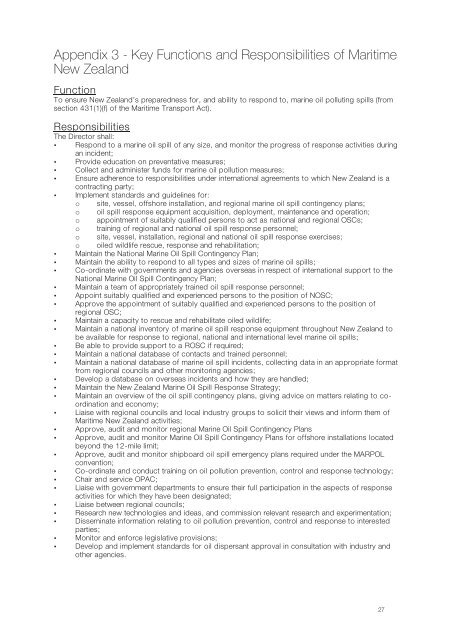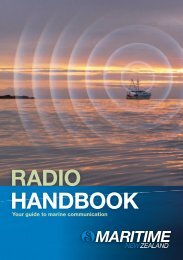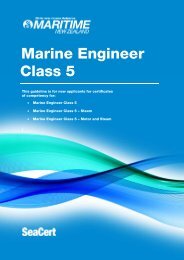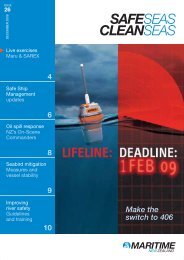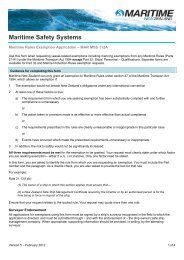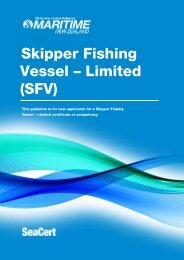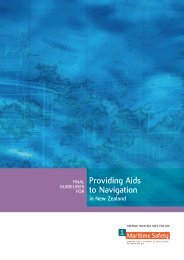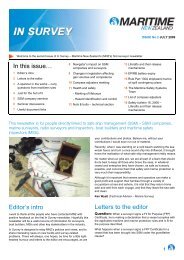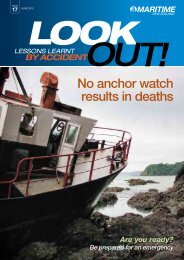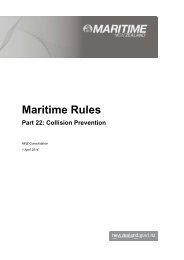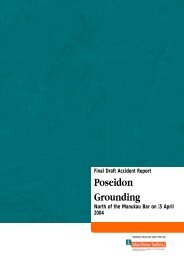New Zealand oil spill response strategy - Maritime New Zealand
New Zealand oil spill response strategy - Maritime New Zealand
New Zealand oil spill response strategy - Maritime New Zealand
Create successful ePaper yourself
Turn your PDF publications into a flip-book with our unique Google optimized e-Paper software.
Appendix 3 - Key Functions and Responsibilities of <strong>Maritime</strong><br />
<strong>New</strong> <strong>Zealand</strong><br />
Function<br />
To ensure <strong>New</strong> <strong>Zealand</strong>’s preparedness for, and ability to respond to, marine <strong>oil</strong> polluting <strong>spill</strong>s (from<br />
section 431(1)(f) of the <strong>Maritime</strong> Transport Act).<br />
Responsibilities<br />
The Director shall:<br />
• Respond to a marine <strong>oil</strong> <strong>spill</strong> of any size, and monitor the progress of <strong>response</strong> activities during<br />
an incident;<br />
• Provide education on preventative measures;<br />
• Collect and administer funds for marine <strong>oil</strong> pollution measures;<br />
• Ensure adherence to responsibilities under international agreements to which <strong>New</strong> <strong>Zealand</strong> is a<br />
contracting party;<br />
• Implement standards and guidelines for:<br />
o site, vessel, offshore installation, and regional marine <strong>oil</strong> <strong>spill</strong> contingency plans;<br />
o <strong>oil</strong> <strong>spill</strong> <strong>response</strong> equipment acquisition, deployment, maintenance and operation;<br />
o appointment of suitably qualified persons to act as national and regional OSCs;<br />
o training of regional and national <strong>oil</strong> <strong>spill</strong> <strong>response</strong> personnel;<br />
o site, vessel, installation, regional and national <strong>oil</strong> <strong>spill</strong> <strong>response</strong> exercises;<br />
o <strong>oil</strong>ed wildlife rescue, <strong>response</strong> and rehabilitation;<br />
• Maintain the National Marine Oil Spill Contingency Plan;<br />
• Maintain the ability to respond to all types and sizes of marine <strong>oil</strong> <strong>spill</strong>s;<br />
• Co-ordinate with governments and agencies overseas in respect of international support to the<br />
National Marine Oil Spill Contingency Plan;<br />
• Maintain a team of appropriately trained <strong>oil</strong> <strong>spill</strong> <strong>response</strong> personnel;<br />
• Appoint suitably qualified and experienced persons to the position of NOSC;<br />
• Approve the appointment of suitably qualified and experienced persons to the position of<br />
regional OSC;<br />
• Maintain a capacity to rescue and rehabilitate <strong>oil</strong>ed wildlife;<br />
• Maintain a national inventory of marine <strong>oil</strong> <strong>spill</strong> <strong>response</strong> equipment throughout <strong>New</strong> <strong>Zealand</strong> to<br />
be available for <strong>response</strong> to regional, national and international level marine <strong>oil</strong> <strong>spill</strong>s;<br />
• Be able to provide support to a ROSC if required;<br />
• Maintain a national database of contacts and trained personnel;<br />
• Maintain a national database of marine <strong>oil</strong> <strong>spill</strong> incidents, collecting data in an appropriate format<br />
from regional councils and other monitoring agencies;<br />
• Develop a database on overseas incidents and how they are handled;<br />
• Maintain the <strong>New</strong> <strong>Zealand</strong> Marine Oil Spill Response Strategy;<br />
• Maintain an overview of the <strong>oil</strong> <strong>spill</strong> contingency plans, giving advice on matters relating to coordination<br />
and economy;<br />
• Liaise with regional councils and local industry groups to solicit their views and inform them of<br />
<strong>Maritime</strong> <strong>New</strong> <strong>Zealand</strong> activities;<br />
• Approve, audit and monitor regional Marine Oil Spill Contingency Plans<br />
• Approve, audit and monitor Marine Oil Spill Contingency Plans for offshore installations located<br />
beyond the 12-mile limit;<br />
• Approve, audit and monitor shipboard <strong>oil</strong> <strong>spill</strong> emergency plans required under the MARPOL<br />
convention;<br />
• Co-ordinate and conduct training on <strong>oil</strong> pollution prevention, control and <strong>response</strong> technology;<br />
• Chair and service OPAC;<br />
• Liaise with government departments to ensure their full participation in the aspects of <strong>response</strong><br />
activities for which they have been designated;<br />
• Liaise between regional councils;<br />
• Research new technologies and ideas, and commission relevant research and experimentation;<br />
• Disseminate information relating to <strong>oil</strong> pollution prevention, control and <strong>response</strong> to interested<br />
parties;<br />
• Monitor and enforce legislative provisions;<br />
• Develop and implement standards for <strong>oil</strong> dispersant approval in consultation with industry and<br />
other agencies.<br />
27


